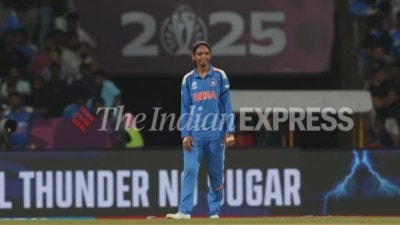The political class was hoping that the Supreme Court takes a final view on the question of legalisation of same-sex marriage and not put the “politically uncomfortable” and “inconvenient” ball in Parliament’s court. On Tuesday, the apex court did precisely that as a five-judge Constitution Bench headed by Chief Justice of India D Y Chandrachud unanimously declined to recognise same-sex marriage, ruling that it is for Parliament to decide.
Most of the parties either chose to remain silent on the top court’s judgment or took a stance that it has to be studied in detail.

While opposing the pleas seeking recognition to same-sex marriage, the Centre had urged the apex court to leave the decision to Parliament, but individual leaders who support a legislation for it believe the government just wanted to kick the can down the road.
Without commenting on the verdict, the Congress said it has always stood in favour of protecting the freedoms, choices, liberties and rights of citizens.
Significantly, the Congress-ruled Rajasthan was among the few states which opposed the pleas for same sex marriages. In its response to the Centre on the issue, the Rajasthan government said the public mood in the state appeared to be against it but added that if two same-sex people voluntarily decide to live together, it could not be termed wrong.
While the RSS and VHP welcomed the top court’s verdict, the ruling BJP remained silent, which was predictable given that the government was opposed to the pleas. The Centre had earlier told the court that it was willing to form a Cabinet Secretary-headed committee to consider administrative measures for addressing “genuine, human concerns” faced by same-sex couples in their daily lives – thereby stopping short of accepting the pleas.
The RSS welcomed the verdict. “The Supreme Court’s decision on same-sex marriage is worth welcoming. Our democratic parliamentary system can seriously discuss all the issues related to this and take appropriate decisions,” Sunil Ambekar, Akhil Bharatiya Prachar Pramukh of the RSS, said in a post on X.
Story continues below this ad
The VHP was more forthright. “We are satisfied that the Supreme Court, after listening to all the parties concerned, including Hindu, Muslim and Christian followers, has given the decision that the relationship between two homosexuals in the form of marriage is not eligible for registration. This is not even their fundamental right…Not giving homosexuals the right to adopt a child is also a good step,” VHP national working president Alok Kumar said.
The Opposition voices that argue in favour of same-sex marriage believe the government is simply shilly-shallying. “I have no doubt that the government neither intends nor will bring in the desired legislation for such a purpose,” Abhishek Singhvi, senior Congress leader and one of the key lawyers in the case, told The Indian Express.
Senior Congress MP Shashi Tharoor said, “We know the ruling party is the least likely to do so. At least the court heard all the arguments on both sides. I doubt the BJP will even want the issue discussed in Parliament, let alone bringing a law.”
Officially, Congress communication head Jairam Ramesh said, “On the same-sex marriage and related issues we are studying the different and differing judgments delivered in the Supreme Court today and will have a detailed response subsequently. Indian National Congress has always stood with all our citizens to protect their freedoms, choices, liberties and rights. We, as a party of inclusion, firmly believe in non discriminatory processes — judicial, social, and political.”
Story continues below this ad
While the JD(U) said it was not in support of same-sex marriage, the SP and BSP said they were studying the judgment.
Talking to The Indian Express, JD(U) spokesperson K C Tyagi said while no one was against anybody’s freedom, his party was not in support of same-sex marriage. He said the JD(U) will not stand in support if the government brings a Bill in Parliament.
Calling the issue a “legal matter”, SP MP Javed Ali Khan declined to comment. BSP MP Ramji Gautam said he will comment only after studying the judgment.
The CPI(M) and the CPI did not issue any statements. It is another matter that they were the only parties that took a clear position supporting decriminalisation of same-sex relations when the Delhi High Court first ruled in 2009 that consensual intercourse between two adults was not illegal.
Story continues below this ad
Senior CPI(M) leader Brinda Karat told The Indian Express that she supported the minority judgment. “I agree with the approach of the Chief Justice of India in a minority judgment. Jurisdictional issues as far as not having a law which is why they did not want to legalise it leaving it to Parliament..but at least the acceptance of a union which the CJI has spoken about … that should have at least been the major gain of this entire exercise. But unfortunately it was only a minority opinion. But there is still a way before there can be justice for those with alternative sexuality,” she said.
Singhvi said: “I must confess that I am disappointed. It is a historic opportunity missed. To accommodate same-sex marriage within the existing language of the Special Marriage Act is certainly not an unimaginable leap which the judiciary has never taken before. It is a far smaller interpretive advance than what was done when the basic structure doctrine was created or when substantive due process was brought in from the backdoor into Article 14 or when so many privacy related rights were read into Article 31 of the Constitution or reading consultation to mean concurrence in judicial appointments.”
He said the apex court “appears to be overawed and hence backtracked in the face of the supposed antipathy of the public to same-sex issues falsely projected by the Government of India”. He added, “I await a second opportunity to advance the law to the desirable level.”
Tharoor said the verdict “sounds like the earlier judgment on homosexuality, which the court overturned”. “When Parliament failed to consider, let alone debate or pass, my proposal to decriminalise same-sex relations under Section 377, I urged the NGOs who had approached me to try the Supreme Court again. They did, and they succeeded because the court re-interpreted the existing rights and freedoms of Indian citizens more expansively than before. Today, they have done exactly the opposite and put the ball back in Parliament’s court. I have no doubt that, as on the previous issue, a later Supreme Court will take a more liberal view,” he said.
Story continues below this ad
Muslim organisation Jamiat Ulema-e-Hind hailed the judgment, saying it “reinforces the preservation of the traditional institution of marriage”.
– With inputs from Lalmani Verma

































